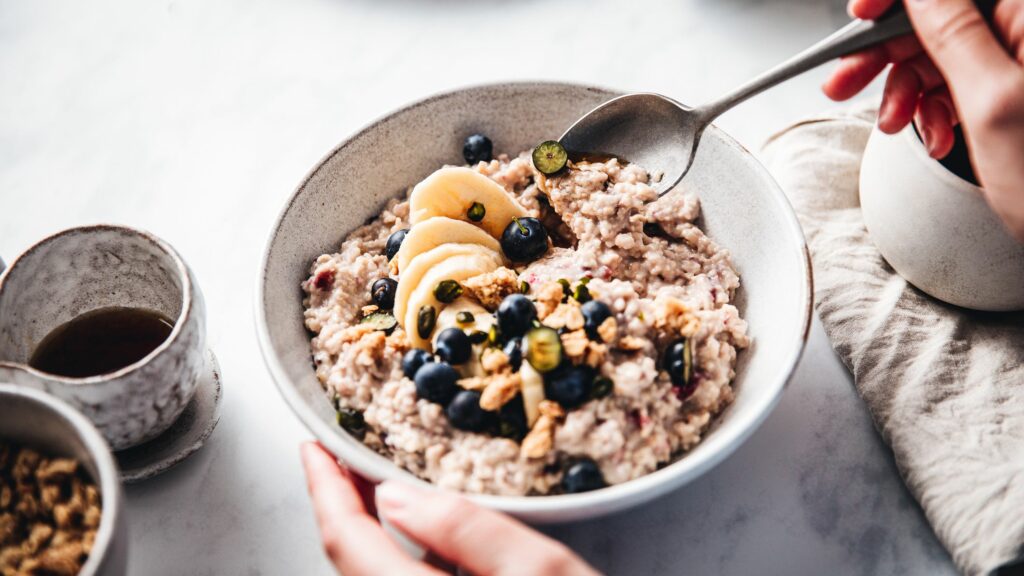There are a lot of different diets out there these days. That is one of the reasons it is hard to figure out which one is the best for you. One popular diet is the low-fat diet. This type of diet limits the amount of fat that you eat each day. Proponents of the low-fat diet say that it can help you lose weight and improve your health. However, there are also some drawbacks to this type of diet. In this blog post, we will discuss the pros and cons of following a low-fat diet and answer the question “Do Low-Fat Diets Work”?
Contents
What is a Low-Fat Diet?
 A low-fat diet is a type of diet that limits the amount of fat that you eat each day. Most low-fat diets recommend eating no more than 30% of your daily calories from fat. This means that if you are eating a 2000-calorie diet, you should be eating no more than 60 grams of fat each day.
A low-fat diet is a type of diet that limits the amount of fat that you eat each day. Most low-fat diets recommend eating no more than 30% of your daily calories from fat. This means that if you are eating a 2000-calorie diet, you should be eating no more than 60 grams of fat each day.
Fat is found in many foods, including meats, dairy products, nuts, and oils. When you are following a low-fat diet, you will need to be careful about the types of food that you eat and make sure that you are not eating too much fat.
There are a lot of different ways to follow a low-fat diet. Some people may choose to eat mostly lean proteins and vegetables, while others may eat some fruit and whole grains as well. It is important to figure out what type of foods you can and cannot eat on this diet before you start.
A low-fat diet can help you lose weight because it helps you reduce your calorie intake. When you consume fewer calories, your body will start to burn stored fat for energy, which can lead to weight loss.
Pros Of A Low Fat Diet
A low-fat diet is beneficial in many ways. Some of the most potential benefits of following a low-fat diet are:
Help in weight loss
Many people who follow a low-fat diet do so in order to lose weight. And there is some evidence to suggest that a low-fat diet can help you lose weight. One study found that people who followed a low-fat diet for 12 weeks lost an average of 11 pounds. Diets low in fat help in weight loss by reducing the number of calories you eat each day.
Reduce the risk of heart disease
 Heart disease is a leading cause of death in the world. A low-fat diet can help reduce your risk of developing heart disease by reducing the amount of cholesterol and saturated fat in your diet. One study found that people who followed a low-fat diet for eight years had a lower risk of developing heart disease than those who did not follow a low-fat diet.
Heart disease is a leading cause of death in the world. A low-fat diet can help reduce your risk of developing heart disease by reducing the amount of cholesterol and saturated fat in your diet. One study found that people who followed a low-fat diet for eight years had a lower risk of developing heart disease than those who did not follow a low-fat diet.
Lower cholesterol levels
Cholesterol is a type of fat that can build up in your arteries and lead to heart disease. Accumulation of bad cholesterol in the arteries is one of the major risk factors for diseases like heart attack and stroke. A low-fat diet can help reduce your cholesterol levels by a significant factor. One study found that people who followed a low-fat diet for eight weeks had lower cholesterol levels than those who did not follow a low-fat diet.
Lower the incidence of cancer
There is some evidence to suggest that a low-fat diet can lower the incidence of cancer. One study found that women who followed a low-fat diet for eight years had a lower risk of developing breast cancer than those who did not follow a low-fat diet. Cancers are caused by the abnormal growth of cells in the body. A low-fat diet can help reduce your risk of developing cancer by reducing the amount of fat in your diet.
Aid in insulin-dependent diabetes
 A low-fat diet can help people with insulin-dependent diabetes control their blood sugar levels. One study found that people who followed a low-fat diet for eight weeks had better blood sugar control than those who did not follow a low-fat diet. The role of fat in diabetes is not fully understood, but following a low-fat diet can ensure the regulation of blood sugar levels in people with diabetes.
A low-fat diet can help people with insulin-dependent diabetes control their blood sugar levels. One study found that people who followed a low-fat diet for eight weeks had better blood sugar control than those who did not follow a low-fat diet. The role of fat in diabetes is not fully understood, but following a low-fat diet can ensure the regulation of blood sugar levels in people with diabetes.
Improves bone health
Bone health is important for everyone, but it’s especially critical for women. That’s because women are more likely to develop osteoporosis, a condition that weakens bones and makes them more susceptible to fractures. A low-fat diet can help improve your bone health by reducing your risk of osteoporosis. Studies have shown that a low-fat diet can help increase bone density and reduce the risk of fractures as well.
Cons Of A Low Fat Diet
There are also some potential drawbacks to following a low-fat diet that raises the question of, do low-fat diets work or not.
Important nutrients may be lacking
Fat is an important nutrient that the body needs in order to function properly. When you follow a low-fat diet, you may miss out on important nutrients that are found in fatty foods such as omega-three fatty acids. Omega-three fatty acids are found in fish and are important for a healthy heart.
Trouble sticking to the diet
A low-fat diet can be difficult to stick to. Fatty foods are often more delicious than non-fatty foods, and it can be hard to resist the temptation to eat them. People find it difficult to stick to low-fat diets because they are often restrictive and can be boring and repetitive.
Unsustainable weight loss
 Weight loss that is achieved on a low-fat diet is often not sustainable in the long term. While a low-fat diet can help you lose weight, you may not lose as much weight as you would like. This is because a low-fat diet can be difficult to stick to and you may not be getting all of the nutrients that you need. This might lead you to feel tired and sluggish.
Weight loss that is achieved on a low-fat diet is often not sustainable in the long term. While a low-fat diet can help you lose weight, you may not lose as much weight as you would like. This is because a low-fat diet can be difficult to stick to and you may not be getting all of the nutrients that you need. This might lead you to feel tired and sluggish.
Hormonal imbalance
Fat is an important component of hormones, and a low-fat diet can cause your hormone levels to become out of balance. This can lead to side effects such as fatigue, anxiety, and depression. Hormonal imbalance in women can also lead to problems with fertility and reproductive health.
Increased risk of developing some diseases
While a low-fat diet can help reduce the risk of developing some diseases, it can also increase the risk of developing other diseases. For example, a low-fat diet may increase the risk of developing osteoporosis. Also, studies have found that low-fat diets can increase the risk of developing colon cancer.
Unable to absorb certain vitamins
 Fat is needed for the absorption of certain vitamins, such as vitamins A, D, E, and K. When you follow a low-fat diet, you may not be able to absorb these vitamins as well. This can lead to deficiencies in these vitamins which causes problems such as dry skin, easy bruising, and bone loss.
Fat is needed for the absorption of certain vitamins, such as vitamins A, D, E, and K. When you follow a low-fat diet, you may not be able to absorb these vitamins as well. This can lead to deficiencies in these vitamins which causes problems such as dry skin, easy bruising, and bone loss.
A low-fat diet may not be right for everyone. If you are considering following a low-fat diet, it is important to talk to your doctor first. They can help you decide if a low-fat diet is right for you and how to make sure you are getting all of the nutrients you need.
Do Low-Fat Diets Work?
The pros and cons of a low-fat diet are highly debated. Some people swear by low-fat diets, while others find them difficult to stick to. So, what’s the verdict? Do low-fat diets work?
The debate surrounding low-fat diets is largely due to the different interpretations of “low fat.” For some people, “low fat” means eliminating all sources of fat from their diet. Others allow for small amounts of healthy fats, such as avocados and olive oil.
There are pros and cons to both approaches. Eliminating all fat from your diet can lead to nutrient deficiencies, as fat is an essential part of a healthy diet. It can also be difficult to stick to a no-fat diet long-term, as many delicious and nutritious foods are high in fat.
On the other hand, allowing for small amounts of healthy fats in your diet can help you feel satisfied and less likely to overeat. It can also help you absorb certain vitamins and minerals, such as vitamins A and D.
Hence, the answer to the question “do low-fat diets work or not” solely depends on the requirement of your body.
Conclusion
In conclusion, low-fat diets have both pros and cons. While they may be effective for short-term weight loss, they may not be the best choice for long-term health. There is no one-size-fits-all answer. The best diet for you is the one that you can stick to long-term and that provides you with all the nutrients you need. If you are considering a low-fat diet, be sure to talk to your doctor or a registered dietitian first to make sure it is right for you. Our team of highly professional and experienced healthcare providers at Mantra Care also helps you in developing healthy and sustainable Weight loss plans that fit your individual needs. Contact us today to learn more!


